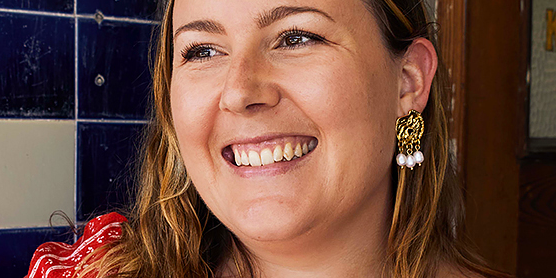Does Your Labia Really Shrink During Menopause?

Menopause is often discussed in terms of hot flashes, mood swings, and changes in libido, but there's a lesser-known conversation happening on social media right now - one about the physical changes to the vulva and labia during this transition.
Dr Rachel Rubin, a board-certified urologist and sexual medicine expert, took to TikTok to share that part of the vulva can actually disappear during menopause.
“These labia minora — when you’re a baby you don’t have them, you grow them in puberty, and you lose them in menopause,” Rubin said in her TikTok.
We asked our Recommended Providers experts to weigh in on the conversation.
Dr. Moira Bradfield Strydom (PhD), naturopath and the founder of Intimate Ecology, confirmed that menopause can impact our vulva due to the changes in estrogen.
“Estrogen helps maintain the structure and elasticity of vulval tissue, and as it decreases, the labia and even the clitoris can experience changes. Some women may notice their labia appearing thinner, smaller, saggier, or even resorbing due to vaginal atrophy, this can be part of a condition called the Genitourinary Syndrome of Menopause (GSM). In GSM these tissue changes occur e.g where the skin becomes thinner, drier, and less elastic and may also be associated with urinary, vaginal and sexual health changes” she said.
She added that beyond atrophy, conditions like lichen sclerosus - a dermatological condition more commonly occurring when estrogen levels are low - can cause the labia to change shape, inflame, adhere together, or even shrink over time. These changes don’t happen to everyone, but they are a possibility.
This isn’t exclusive to menopause. Similar changes can occur during chemotherapy, breastfeeding or while taking medications that suppress estrogen, leading to vulval atrophy and dryness.
Does Every Woman Lose Part of Her Labia?
Not necessarily, explained Bradfield Strydom.
“While some women experience noticeable changes, others go through menopause with minimal or no vulval tissue changes at all. Our bodies all respond differently based on genetics, hormonal shifts, lifestyle, and underlying health conditions.”
Pleasure Activist and Sex Coach Penny van der Sluys, who works with women in midlife and has gone through menopause herself, says it's common for women at this stage of their life to be disconnected from their vulvas and she'd love to see the attention focus on helping vulva owners create an empowering relationship with this part of their body.
She expressed concern that the social media conversation may unnecessarily alarm women that they may lose their pleasure-focused anatomy without explaining how it'll impact their sensual experience, and it's adding to society’s already persistent fear and confusion of menopause.
“The changes in our body experience throughout life, and as we age, are natural, they are made out to be wrong and something to fear and fix, and hand over to other people who ‘know’ better. I’d love to see messaging about changes that naturally happen to our body discussed with an understanding that change to shape and size isn’t a negative thing, all our bodies are different, and all our experiences are different, and there are so many factors that play into why our bodies change and react as they do. Listening and trusting our body, being curious and aware of what is ‘normal’ for our own body is a healthy way to be comfortable in our skin,” van der Sluys added.
How to Support Your Vulva Through Menopause
If you’re noticing changes or experiencing discomfort, Sexuality Clinician Lauren Cummings recommends a few simple ways to support your body through this transition.
Moisturise and Lubricate
Just as our skin needs extra hydration as we age, vaginal tissue also benefits from regular moisture. Vaginal moisturisers, like YES® VM Vaginal Moisturiser, provide ongoing hydration and help maintain the natural elasticity of vulva and vaginal tissue. Unlike lubricants, which offer immediate relief during intimacy, moisturisers work to replenish moisture levels over time, reducing dryness and irritation in everyday life.
For those experiencing discomfort during sex, a pH-balanced, water-based lubricant can make a significant difference. Products like Good Clean Love Almost Naked® Personal Lubricant mimic natural vaginal secretions, reducing friction and enhancing comfort without disrupting the delicate vaginal environment.
For a natural, oil-based option, Olive & Bee Intimate Cream offers a gentle, chemical-free solution made from just extra virgin olive oil and beeswax. Developed by pelvic health physiotherapist Claire Osterstock and a pharmacist, Olive & Bee can be used daily as a vaginal moisturiser or during intimacy to soothe dryness and irritation.
Whatever you decide, because there is no ‘one-size-fits-all’ it’s important to avoid ingredients like parabens, glycerin, and petroleum-based oils, which can cause irritation or disrupt vaginal pH. Instead, opt body-safe formulas that support rather than compromise vaginal health.
Menopause Isn’t Something to Fear
There’s a fine line between awareness and fear, and it’s important that conversations about menopause don’t spiral into unnecessary panic. Our bodies are meant to change - it’s not something to fix or be ashamed of. The key is learning how to support yourself through the process in a way that works for you.
At Comfortable in My Skin, we believe in embracing the transitions our bodies go through with curiosity. Listen to your body, learn what’s normal for you, and trust that this is just another chapter in your body’s story - not the end of it.
Our Recommended Providers are here to help you on your journey. Check out our experts here.
0 comments




